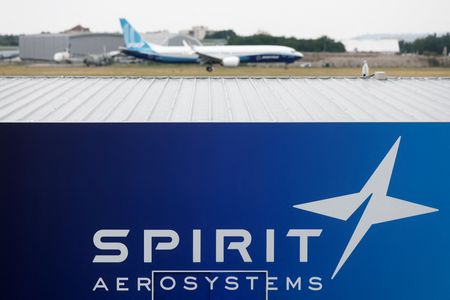By Abhijith Ganapavaram and Valerie Insinna
(Reuters) -Spirit AeroSystems will invest in autonomous technology to limit any defects in its production of Boeing 737 fuselages, its CEO said Tuesday after a series of manufacturing problems and last month’s mid-air blowout on a 737 MAX 9.
Boeing and Spirit, which builds the entire 737 fuselage, are under scrutiny from investors, regulators and lawmakers after a door plug detached from a MAX 9 in flight.
There were no serious injuries, but the U.S. Federal Aviation Administration (FAA) has barred U.S. planemaker Boeing from lifting its production of the 737 MAX. The U.S. National Transportation Safety Board will release its preliminary report into the Jan. 5 incident later on Tuesday.
Spirit, which was already under the microscope for a series of manufacturing snafus related to the 737 MAX, last week identified a new quality issue concerning misdrilled holes on 737 window frames, which could force it and Boeing to undertake additional work on about 50 aircraft.
Interim CEO Patrick Shanahan said on Tuesday that Spirit expects to have a repair plan identified within 72 hours.
Spirit did not give a forecast for 2024, citing uncertainty on the timing of 737 MAX production increases and ongoing price negotiations with Airbus focused on the A220 program, which Shanahan said could conclude as early as this month.
Spirit shares, which have fallen about 16% since January’s mid-air blowout, were up 6.5% in early afternoon trading.
Shanahan said Spirit will increase training for mechanics and the number of Boeing and Spirit-performed inspections, as well as taking steps to “mistake-proof” 737 MAX production.
“The mindset shift is to understand that the airplane is the boss. The airplane tells us what to do,” he said.
While full scale robotics are “impractical” in Spirit’s Wichita, Kansas-based factory, Shanahan said the company is looking to accelerate technology that can make it easier for mechanics to build the front and rear portions of the 737 fuselage, which are the most confined and complex workspaces.
Shanahan said executive compensation would also be more heavily weighted toward quality in the future.
Spirit executives said it paused 737 production in the fourth quarter to stabilize operations, allowing it to deliver 104 fuselages to Boeing, its highest quarterly total for 2023.
The company is currently producing at a rate of 38 737 fuselages per month, and Shanahan added that its supply chain is ready to support 42 jets per month.
It delivered 356 737 fuselages in 2023, hitting its revised target of 345 to 360 units, which it lowered in October from an initial 370 to 390 goal.
Spirit reported free cash flow of $42 million for the quarter due to $100 million funding received from Boeing, but that fell short of analyst expectations of $122.35 million.
The company had said it expects to generate free cash in 2024 after years of cash burn on cost overruns and supply jams.
Under an agreement reached in October to alleviate soaring costs, Boeing agreed to provide Spirit with immediate funding and revised prices for 737 and 787 production.
This helped Spirit reverse some forward losses of $34.3 million during the quarter through December but it recorded losses on the Airbus A350 program of $76.0 million and Airbus A220 program of $57.7 million.
Airbus declined to comment on the ongoing talks with Spirit.
Spirit reported an adjusted profit per share of 48 cents for the quarter, compared with expectations of 87 cents, while its revenue rose 37% to $1.81 billion, beating expectations of $1.74 billion due to higher parts deliveries.
(Reporting by Abhijith Ganapavaram in Bengaluru; Editing by Maju Samuel and Sriraj Kalluvila)


